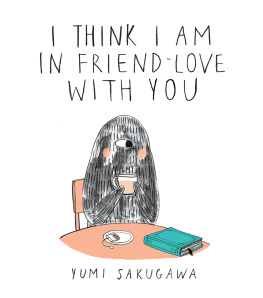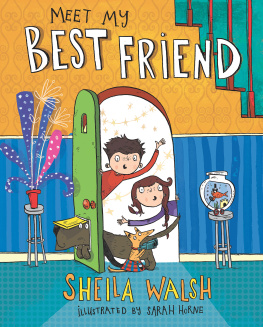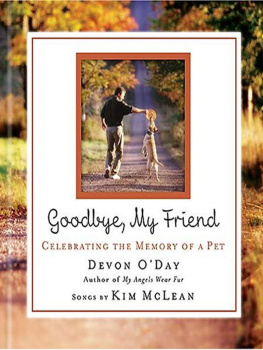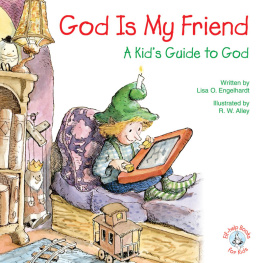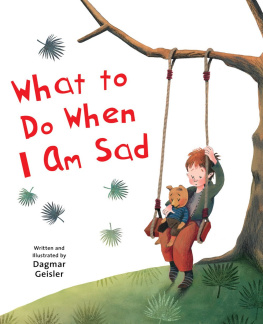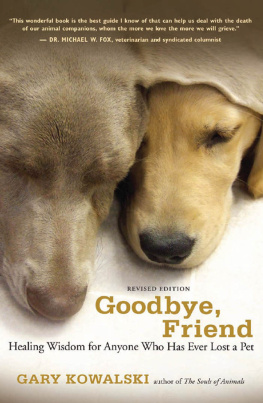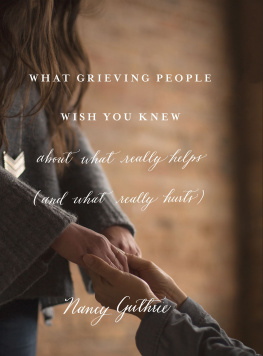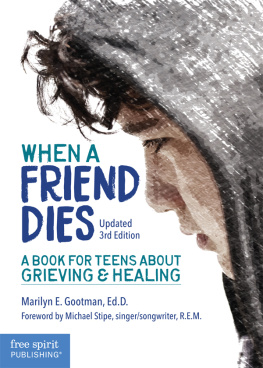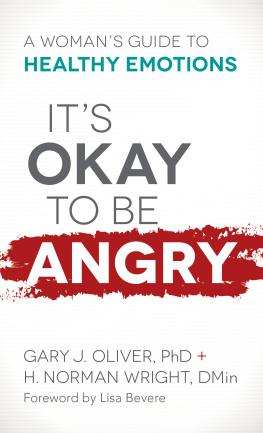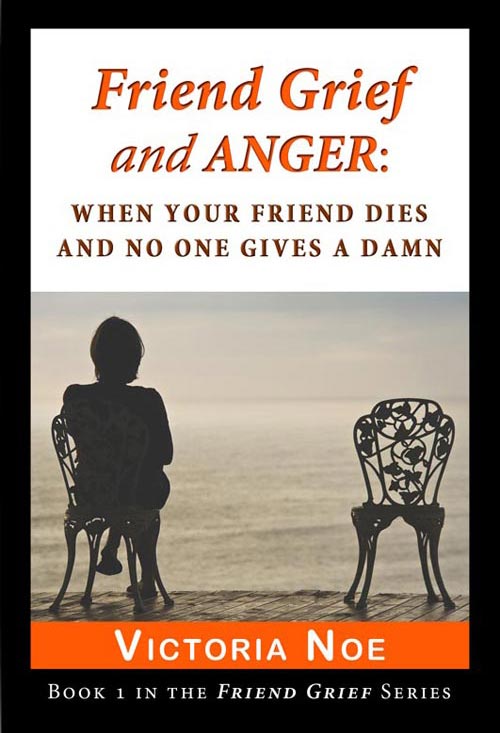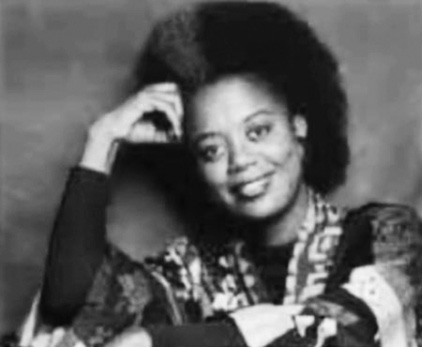Friend Grief
and ANGER:
WHEN YOUR FRIEND DIES
AND NO ONE GIVES A DAMN
V ICTORIA N OE
Photograph of Delle Chatman reproduced with permission from Gregory Chatman
Excerpt from Outrageous Conduct: Art, Ego and The Twilight Zone Case used with permission by Stephen Farber.
Copyright 2013 by Victoria Noe
Cover design: Rebecca Swift
Editor: Melissa Wuske
All rights reserved. This book or any portion thereof may not be reproduced or used in any manner whatsoever without the express written permission of the publisher except for the use of brief quotations in a book review.
This book is not intended as a substitute for therapeutic or medical advice. The reader should regularly consult a health professional in matters relating to his/her health and particularly with respect to any symptoms that may require diagnosis or medical attention.
For a list of grief support resources: www.FriendGrief.com
Printed in the United States of America
First Printing, 2013
ISBN 978-0-9884632-1-9
ISBN 978-0-9884632-0-2 (print)
King Company Chicago, IL 60618
www.FriendGrief.com

Dedication
To Delle Chatman, who was right as always

Introduction:
The Shock of Anger
I n the spring of 2011, two months after I started my blog, Friend Grief, Tracy Baim, publisher of Chicagos oldest gay/lesbian newspaper, Windy City Times , asked if Id contribute to their excellent, year-long series, AIDS@30. The series would chronicle the AIDS epidemic from local, national and international perspectives. Id known her since I worked as a staff and consulting fundraiser in the Chicago AIDS community in the late 80s and early 90s.
The first decade of the epidemic was a frightening time. Ignorance and hate were on constant display. Id run into people, mostly men, I hadnt seen for a while and cringe when they had the look. There was a certain look about those with AIDS: emaciated body, dark lesions, haunted eyes.
The weekly gay papers were full of obituaries. The mainstream papers simply attributed the cause of death to a long illness but we knew the truth. For years, our social lives revolved around memorial services and fundraising events. My work was gratifying, but emotionally exhausting.
When I sat down at my computer, I hoped I could remember enough specifics about that time in my life to fill Tracys guidelines. To my surprise, instead of having trouble remembering, words flew off my fingertips, burning up the keyboard with long-suppressed rage.
I can name names, I thought to myself. What difference does it make? Theyre dead.
I was shocked at the depth of those feelings. I hadnt thought about that time for years, and assumed Id gotten over the anger long ago. When I first started writing the piece, I wallowed in it, enjoying my self-righteous anger. Gradually I calmed down. But my reaction still surprised me.
Grieving a friend is difficult enough. To compound it, you may also feel that your grief is not respected: that it is, in the words of Dr. Kenneth Doka at the College of New Rochelle, disenfranchised grief.
Doka coined the phrase to describe grief that is not openly acknowledged, socially validated or publicly observed.
Maybe you tried to share your sad news, only to be confronted by people who dismiss it entirely or find it lacking in comparison to their own. They might tell you their grief is more profound than yours especially if they grieve a family member. Others will tell you they know just how you feel because their cat died. Im not going to debate anyone about the depth of grief they felt when their pet died, much less a relative. But for me, grieving a friend poses its own unique challenges.
Although it happens to us all sooner or later, your grief after the death of your friend may surprise you.
We tend to take our friendships for granted, especially the long-term ones. Our friends are a part of our lives, and we assume they will just always be there, even if we see them rarely.
We feel all the normal responses to news of a death: shock, disbelief, regret, sadness. The one that may surprise you the most is anger, because its probably the response thats talked about the least.
In the following pages, well look at people whose anger after a friends death was very real. The focus of the anger varies: sometimes its directed at what or who killed them, sometimes its the friend themselves. Sometimes, the deepest anger is reserved for themselves.
These stories will help you acknowledge your anger and be comforted by the fact that youre not alone in this very human response. And they may even help you take the first steps towards moving through that anger.
Like the other stages of grief we hear so much about, anger is normal and natural. And now were going to admit it.

Who Are You Angry With?
A nger can be unattractive, theres no question about it. Its messy and unpredictable, sometimes loud and violent. And in a world where we like things to make sense, its often unacceptable. But its never more unacceptable than when youre grieving. Theres a long list of people we can be angry with:
The person who died: Why didnt they take better care of themselves? Why did they take such a stupid chance? What were they thinking?
The medical community: Why didnt the doctor force them to take better care of their health? Why didnt the paramedics get there sooner? Why hasnt someone discovered a cure for cancer, or heart disease?
The family: Why didnt they make him go to the doctor? Why did they let her live alone?
God: Why did you make a good person suffer? Why didnt you answer their prayers? Why did you leave those children without a parent? Why them? Why now? Why not someone else? Why not me?
Why?
Why?
Why?
Death is, after all, the great unknown. And that mystery makes us scared about what we will face. Despite stories of white lights and visions of deceased relatives, no ones come back from any extended time in the afterlife. We dont know what awaits us.
And we really dont know why people die when they do. We say it was just their time, and obviously, it was. But that doesnt answer why? As a friend, that sense of helplessness can create even deeper anger.
Many times when Ive grieved Ive been angry, although I rarely shared those feelings. I was ashamed of my anger. I felt that admitting it was shifting the focus away from my friend, and onto me. It felt selfish.
Anger can be useful, but when unacknowledged or suppressed it is more likely to present itself as depression. Thats not what Im talking about here. Im talking about admitting that white-hot, body-shaking, screaming-at-the-top-of-your-lungs rage.
Youve already realized that the grief you feel for your friend is being devalued because youre not family. And that can add to the anger you already feel.
Even those who are also grieving are unlikely to understand your anger. Think of Sally Field melting down in the cemetery in


